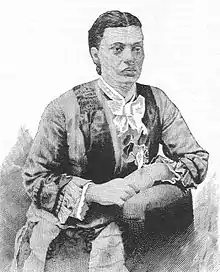Octavia V. Rogers Albert
Octavia Victoria Rogers Albert (December 24, 1853 – August 19, 1889) was an African-American author and biographer.[1][2] She documented slavery in the United States through a collection of interviews with ex-slaves in her book The House of Bondage, or Charlotte Brooks and Other Slaves, which was posthumously published in 1890.[3]
Octavia V. Rogers Albert | |
|---|---|
 | |
| Born | December 24, 1853 Oglethorpe, Georgia |
| Died | August 19, 1889 (aged 35) |
| Occupation | Author and biographer |
| Nationality | American |
| Genre | Biography |
| Notable works | The House of Bondage, or Charlotte Brooks and Other Slaves (1890) |
| Spouse | Aristide Elphonso Peter Albert |
| Children | 1 |
Early life
She was born Octavia Victoria Rogers in Oglethorpe, Georgia, where she lived in slavery until the emancipation. She attended Atlanta University where she studied to be a teacher. Octavia Rogers saw teaching as a form of worship and Christian service. She received her first teaching job in Montezuma, Georgia.
Marriage and family
In 1874, at around 21 years old, she married another teacher and physician, Aristide Elphonso Peter Albert,[4] and they had one daughter together, Laura Thalula Albert (married name Smith).[5] In 1875 Octavia converted to the African Methodist Episcopal Church, a church under the ministry of Henry McNeal Turner, a Congressman and prominent political activist.[6] After her conversion, she then taught because she saw teaching as a form of worship and as a part of her Christian service like her fellow contemporaries. While teaching in Montezuma, Georgia, both she and her husband became strong advocates for education and "American religion" as they used their home to teach reading and writing lessons.[7]
Her husband became an ordained minister in the African Methodist Episcopal Church in 1877.[8] Shortly after the couple married, they moved to Houma, Louisiana.
Publications
The House of Bondage, or Charlotte Brooks and Other Slaves
This book was published in December 1890.[9] Octavia Albert began conducting interviews with men and women in Houma, Louisiana, who were once enslaved. She met Charlotte Brooks for the first time in 1879 and decided to interview her later, along with other former slaves from Louisiana. These interviews were the raw material for her collection of narratives. Excerpts of this work were published in the Southwestern Christian Advocate.[1]
Although most of the book focuses on the narrative of Charlotte Brooks, Albert also implemented the interviews from ex-slaves John Goodwin, Lorendo Goodwin, Lizzie Beaufort, Colonel Douglass Wilson, and a woman known as Hattie. Their interviews and experiences shaped her book The House of Bondage, or Charlotte Brooks and Other Slaves as a mix of slave stories that would expose the inhumanity of slavery and its effects on individuals. Albert's goal in writing her book was to tell the stories of slaves, their freedom, and adjustment into a changing society in order to "correct and create history." The stories of Charlotte Brooks and the others would eventually be compiled into a book after Octavia's death, published in New York by Hunt and Eaton in 1890. Octavia Albert died on August 19, 1889, before The House of Bondage became widely known.[10]
See also
References
- Majors, Monroe Alphus. Noted Negro Women: Their Triumphs and Activities. United States: Donohue & Henneberry, 1893. p.219-221.
- Fleming, John E. “Slavery, Civil War and Reconstruction: A Study of Black Women in Microcosm.” Negro History Bulletin 38, no. 6 (1975): 430–33.
- Albert, O. V. Rogers (Octavia Victoria Rogers)., Mallalieu, W. Francis. The House of Bondage: or, Charlotte Brooks and Other Slaves, Original and Life-like, as They Appeared in their Old Plantation and City Slave Life; Together with Pen Pictures of the Peculiar Institution, with Sights and Insights into their New Relations as Freedmen, Freemen, and Citizens. New York: Hunt & Eaton. 1890.
- Rabi, Geetha (2000-01-01). "Octavia Victoria Rogers Albert". In Nelson, Emmanuel Sampath (ed.). African American Authors, 1745-1945: Bio-bibliographical Critical Sourcebook. Greenwood Publishing Group. pp. 6–12. ISBN 9780313309106.
- "Albert, Octavia Victoria Rogers (1853-1890) | The Black Past: Remembered and Reclaimed". www.blackpast.org. Retrieved 2016-04-11.
- "AAWW Biographies". digital.nypl.org. Retrieved 2016-04-11.
- "Summary of The House of Bondage, or, Charlotte Brooks and Other Slaves, Original and Life Like, As They Appeared in Their Old Plantation and City Slave Life; Together with Pen-Pictures of the Peculiar Institution, with Sights and Insights into Their New Relations as Freedmen, Freemen, and Citizens". docsouth.unc.edu. Retrieved 2016-04-11.
- "American National Biography Online". www.anb.org. Retrieved 2016-04-12.
- "Our Nomen." Freeman (Indianapolis, Indiana) 2, no. 50, December 6, 1890: 3. Readex: African American Newspapers.
- Page, Yolanda Williams (2007-01-30). Encyclopedia of African American Women Writers. Greenwood Publishing Group. ISBN 9780313334290.
External links
- The House of Bondage, or, Charlotte Brooks and Other Slaves, Original and Life-Like, As They Appeared in Their Old Plantation and City Slave Life, complete text of original 1890 edition, along with cover & title page images.